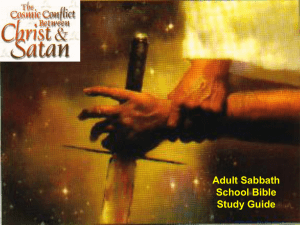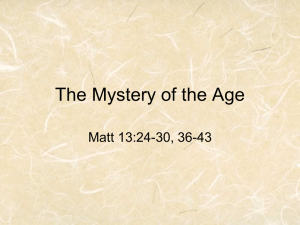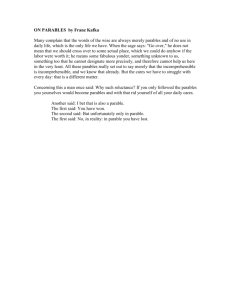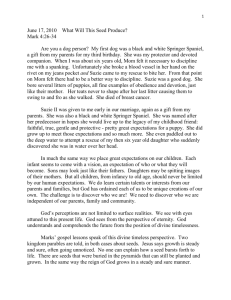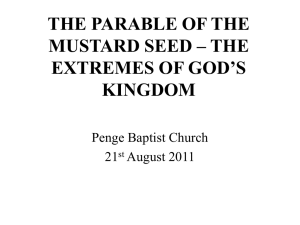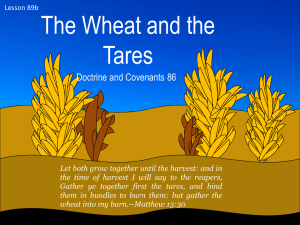The Parable Of The Tares
advertisement
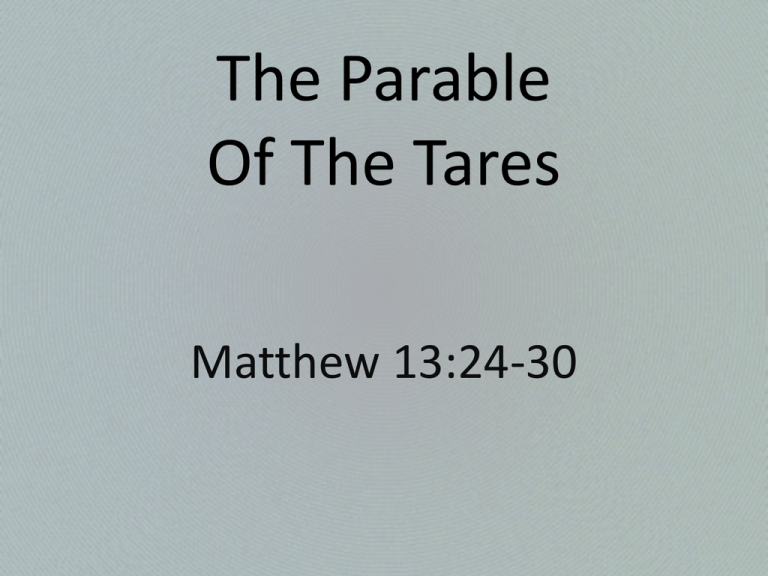
The Parable Of The Tares Matthew 13:24-30 Introduction • In our study of God's word concerning the growth of the Kingdom, we have to view the descriptions as Jesus offered them as symbolism of what the kingdom is like. • The Lord spoke in parables so that those in opposition could not legally have Him arrested for slander. • This type of language is called farce, sarcasm, hyperbole, simile, etc. • Most people understood that there was a moral to the story, but could not figure it out. • As people became enlightened by the truth of the Gospel, their hearts were opened to understand the deep meanings. Parable of the tares • The interpretation of these scriptures must be done so within the guidelines of the Gospel, and any interpretation that opposes or goes against any scripture cannot be valid. • We must make sure that the doctrine presented is pure. • The only way to be sure, is by going to the source and presenting truths from God's holy word, the Bible. Parable of the tares • Please open your bibles with me for a few minutes and let us explain the truths and the messages which were designed to help us understand God's kingdom. • God's kingdom is spiritual in nature. • There is nothing of a physical characteristic there. • Because we are human, we need to view things in the physical sense so that we just might get a clear picture of what it actually is. Parable of the tares • No one knows for sure, until they get there. • John wrote “Beloved, now we are children of God, and it has not appeared as yet what we shall be. We know that, when He appears, we shall be like Him, because we shall see Him just as He is." (1 John 3:2) • Until that time, we have to get word pictures to describe His kingdom. The parables • To explain why we need word pictures; just try to explain to someone who has never seen some things that you have seen and see how hard it is to describe. • When they get opportunity to actually see it, it surpasses most of their expectations. Parable of the tares • Getting back to the parable of the tares we will notice several possibilities as to the interpretation of the passage. • We will notice what the different parts and characters represent based upon the scenario put forth. A Man • In most parables, we understand that the man or owner is the Lord God above. • Also Jesus Christ • Also the Holy Spirit Planted good seed. • The good seed represents the truth and the bad seed represents evil. • In the previous parable, the seed was the word of God. • This parable also carries that thought. • The word expanded to also include the followers of that word. The field. • The field could represent the world in general. • As we see in the beginning, that God looked and saw that all His works were good. • In the beginning they were, until evil came along in the form of a serpent. • Actually, the evil was sin. The field • The field could also represent the Church. • Because membership is comprised only of good clean souls, they have to deal with evil souls all the time, sometimes from within their own midst. • The field could also portray the child of God who succumbs to temptation provided by the enemy of God. His enemy • The enemy of God is Satan. • Satan uses every means at his disposal to lure people away from God. • He like the serpent was crafty and subtle and knows that sometimes the best way to destroy a church is from within, because most churches are ready to defend the gospel. His enemy • The enemy sowed the evil at night. • The same as when God said that the end would come like a thief in the night. • Under the cover of darkness, many types of evil take place. • Darkness provides a measure of cover and stealth. • Also notice that most people sleep at night. • There must not have been a watchman, or that watchman slept through his shift. • But we must also notice that fields usually do not need watchmen, but cities and people do. The plants grow • We also notice that as these plants grow, we see many similarities among them. • I know that wheat and Johnson grass (a weed) look very much alike until they start to produce their seed. • I used to play in wheat fields and I also had to hoe Johnson grass. • Until the plants matured, an in-experienced eye could not tell them apart. The servants report • Now we see that all of a sudden, the things that were supposed to be, start to be seen from experienced eyes. • Where the church thought they were alright, now they see that not all things are alright. • In the world, very few people realize that things are wrong. • We have all of these so-called experts that realize things are wrong, long after others, more observant than they, have pointed them out. • When someone makes a profound quote, it has probably been spoken before by someone less prestigious than the one given the credit for the quote. The servants • The slaves are the servants of the master. • In the world scenario, these would be the Christians. • In the church scenario, these would be the faithful Christians. • In the individual’s heart scenario, this would be the conscience that questions that good seed was planted. Servants were ready to act. • The faithful of the Lord, are always ready to act as the need arises. • The Lord is wise in this case not to let them remove all the tares immediately. • In the world, Christians are to promote the Gospel by being a guiding light to the world. • If the world is removed, then how can Christians evangelize and be examples of light. • In the church, we do not want to close doors to everyone, but keep them exposed to the truth that they may repent and turn from their evil ways. Servants were ready to act. • In our hearts we cannot violate our conscience nor harden it so as to make it callous. • God knows that in the end, the good seed will produce plants that produce more good seed. • If we were to remove the evil, improperly, souls could be forever damaged and we do not need to take that chance. Servants ask permission to act. • The servants came to the master for advice. • Just like God's people turn to His word for advice on matters of judgment and doctrine. • They were denied permission to remove the tares. • The reason was that it could damage good crops. Harvest time • The harvest time represents the end when all are chosen to give an account of their actions. • The good to a reward of joy forever, and the evil to everlasting punishment. • God is going to clean His house before he brings it home. • There are churches that need to clean up their act before God does. • There are individual Christians that need to remove the evil in their lives and turn to be productive for God. The Harvest • The final picture is the gathering of the wheat into the barn. • Notice that the fruit of the wheat is brought in, not the plants that produced them. • From the other parables we see that the plants that do not produce wheat (in this case) are bundled up and cast into the fire. • The book of Revelation paints a picture of those who are cast into the lake of fire (the second death). • If Christians are not careful and do not produce fruit, then they will be numbered with the transgressors. The parable • The whole point of this and the other parables is that we must make every effort to help the kingdom grow. • Just being a good person will not get one into heaven. • It is the person who becomes like God that will be allowed into heaven. • We must learn to love peoples souls just as God does and try everything possible to teach them the truth. • We must maintain the purity of the Church. • This is done by adhering to the word of God. • We must give scriptural authority for every thing we do. The parable • Once again, the question to you is what are you doing to help the kingdom grow? • Will heaven be more or less populated because of you? • We have given you the answer. • You must examine your hearts and search your conscience and determine if you are producing good fruit for God. Conclusion • Are you evangelizing by the way you live? • Are you evangelizing every time you meet someone new? • Are you evangelizing your friends who follow false doctrines? • Are you evangelizing your family, friends, co-workers, neighbors? • If not, can you offer an acceptable excuse to God where there is none? • God makes it clear, you either bear fruit or you burn. • The choice is yours.
